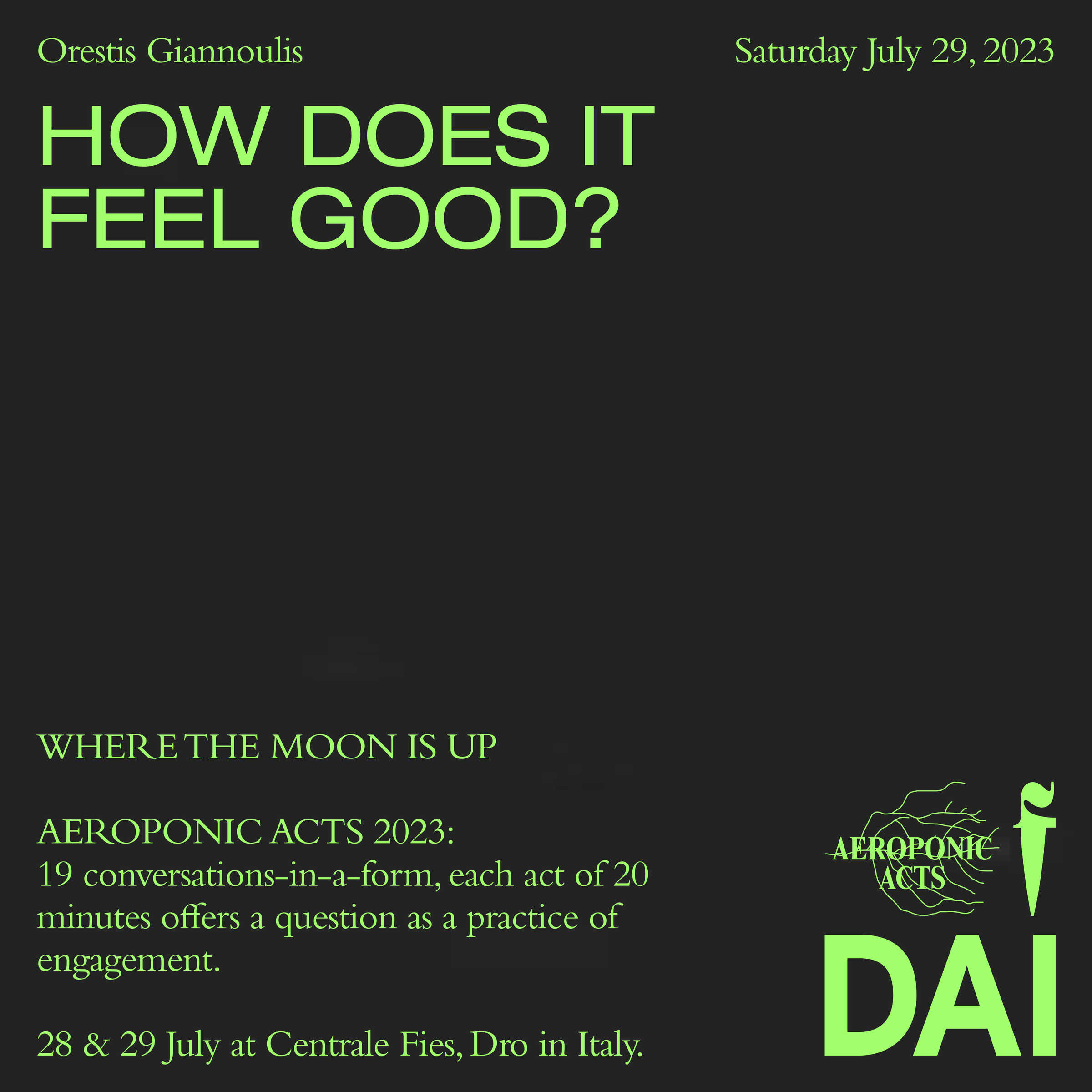Orestis Giannoulis ~ How does it (feel)?
Orestis Giannoulis' "How does it (feel)?" was presented before live audience at Centrale Fies, Dro, Italy on July 29th, 2023 as one of 19 AEROPONIC ACTS of WHERE THE MOON IS UP curated by Elisa Giuliani.
Here you will find the documentation of Orestis Giannoulis' presentation as filmed by Baha Görkem Yalım. The written report is by Giulia Crispiani and it includes a summary of the comments by esteemed guest respondents.
How does it (feel)?
Orestis Giannoulis' question: How does it feel good?
Orestis' introduction: a confused meditation on toxicity, awkwardness, and pleasure/a short reading on intimacy’s discomforts/a wannabe lecture on neediness. How does it? Pure emotion. Let it burn.
Giulia's report: A very emotional greek pop song is playing loud by Greek singer Paula. The audience comes in. The author reads a text, lights on, no props, just a text that is sent to the respondents to read along on their phones.—“I know it feels so good to be needed, to be needy. Neediness is insecure, awkward and potentially humiliating. Spontaneity. Uncertainty.” The author’s reading songs, or translations of songs to script emotional display.—“by listening to this album you’re literally entering my mind”—quoting tiktokers, rappers talking about feeling—“how does it feel?”—greek singer Paula—“whatever is painful vocally. A Political enclosure of suffering. Whatever is painful in Paula’s vocal delivery (…) romani Albanian tradition informed greek music production. Vibration at service of identity.”
Phanuel Antwi “The demanding work of narration”—I loved the simplicity of the delivery, the voice was giving a chance to deliver and was allowed to be without theatrics. Narrative is such a trap, it requires a plot, as if we’re in a journey—you pull attention on how a script works with attention, there’s this attempt to refrain from telling. A move to not trying to be conscripted in the narrative (conscription is deliberate because it’s violent). Intertextuality and montage are attempts to trick the demand of narrative in literature and culture. I can suggest the book “The autobiography of the autobiography of reading” by Dionne Brand.
Ayesha Hameed I said this phrase “I’m looking for ways to disengage from narrative conventions”—you’ve managed to do this, to depart from what we’ve seen in previous conversations, in an active community, very much in conversation with the sensory we had before. I think it’s very beautiful. You enacted this vulnerability by being so stark. The text is an object that becomes part of the performance—our phone. The idea of the anticipatory and the future and the non-yet, how does the future affect the real life? Hyperstition comes down to granular desire, that lands as vulnerability, and projections onto the others. It’s culture but it’s music, which is something very specific. You don’t play the track you mention, still we have a body memory, it’s a projection of a what if, keep the whole thing so simple that you’ve trusted us. Why are we all so sad? I recommend the book “Tainted Love” by Alex Coles.
Francesco Urbano Ragazzi It all will end in tears—you’re dealing with certain feelings and their representation, in this appropriationist practice in your writing, although representation is often a facade, that is at times reality, at times hiding something. The recognition of feelings through words is a complex matter, the authenticity of therapy you spoke of that’s also a mystery. [Quotes a piece of the text] it’s interesting your use of quotes and how your feeling step out of them.
It was beautiful to read and try to keep up, I was in between understanding the meaning of something and losing it. I was indecisive between sound and meaning. The genre resonates with the topic, because pop stars are also a work of auto.fiction. We think we know Dua Lipa but we don’t. Beneath your piece there is a question which is related to our position toward pop culture, because it is a strong both unifying and colonial thing to be confronted with. This is an open question: how to be relevant? The way you glorify a national local tradition, it deals with the answer to this question.
About Orestis Giannoulis
In italiano:
TITOLO: Come ci si (sente)?
DOMANDA: Come ci si sente bene?
una confusa meditazione sulla tossicità, l'imbarazzo e il piacere una breve lettura sui disagi dell'intimità un'aspirante lezione sul bisogno. In che modo? Pura emozione. Lasciate che bruci.


